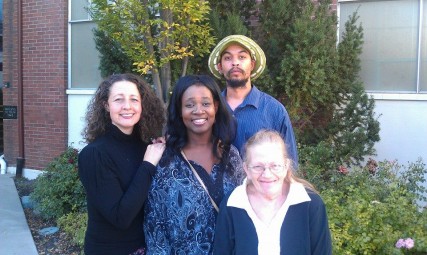The guest speaker at the luncheon was civil rights activist, James Williams. Williams has recently worked on the No New Youth Jail campaign to stop the building of massive and new incarceration facilities for young people in Seattle, instead seeking alternative ways over jails in order to mend and build up neighborhoods and youth. Williams, as one of those who stayed in New Orleans as a community organizer in the Hurricane Katrina after math, helped people get jobs, and get their apartments and residences cleaned up when the apartment managers were leaving everything in ruins, he and his community asked to take over management of their own buildings. Williams said that overwhelmingly it is the poor and thus the African American communities who were unable to return to their homes, generations of families that had to leave New Orleans because of Hurricane Katrina. This tied in with what Griffin said about people not being able to work and not being able to pay rent and being pushed out.
Williams began his speech on civil rights empowerment and what works and what doesn’t by asking people for examples of good community organizing they had experience with. After one activist gave as an example the marches on Washington D.C. during the 1960s and what was accomplished by young people then, Williams made a point of how some of those times are romanticized to the point where it is made out like nothing will ever match the achievements of those times, when it is time to recognize the hard work and achievements of community organizers now.
Williams then spoke of how the original Birmingham Bus Boycott was accomplished. It wasn’t overnight. While Martin Luther King was part of that, a woman named JoAnn Robinson started organizing a small group of her friends. There was a lot of planning and work that happened beforehand. The African-American community wrote letters to the mayor and city officials that black people were putting the most money in the public transportation and they deserved to be treated fairly.
“It was good for a little while then, good for a minute.” Williams said.
Then they had to find new ways to apply pressure to city officials. That’s when MLK was made the movements spokes person and when they started car pooling until the Birmingham Council passed an ordinance outlawing ride sharing unless you were a Taxi. Eventually the federal government stepped in, but the people realized, through all of this, their power, Williams said. But by the 70s, organizers were being less peaceful about their methods, and by the 80s, had lost their way a little bit, because crack destroyed communities and therefore community organizing, since it was so easy to make money that way. Many communities are still recovering from that, Williams explained. What needs to be concentrated on now, Williams went on to say, is activists and protesters sharing with each other methods and strategies where they have been winning. After Williams’ speech, other activists and people who care in the community shared their stories.
Among those who shared their stories of why grass roots movement is important in Spokane outside of the NAACP, is Ryan Holmes, who felt the well-known organization just does not pay much attention or get involved in the social justice needs of people on the east side of Washington state because the African-American population here is so much smaller. Holmes, in 2009, was a bailbondsman with a rapidly growing business who says he was unjustly accused at the time of threatening a former client, because the man had not paid Holmes. Holmes, who had no previous criminal history before that incident, believes he would have been treated much differently, and still be in business today. Holmes attorney at the time according to news online from the time, felt he was lured into being arrested.
Social worker Layne Pavey said she came to the luncheon because, “There is nothing more valuable than social justice, than speaking about your stories and sharing your issues with other people. People don’t realize ‘Hey I’m not the only person who has experienced this or that feels this way.’ When people worry, they feel a loss of agency. People want to be treated with dignity and worth. We’ve got to have faith that humanity can figure itself out and we can get better. As a social worker, I’m in the helping professional. Sometimes helping professionals think ‘I’ll help you, you can’t help yourself. But rather, helping professionals need to think of how people can help themselves to be more empowered.”







